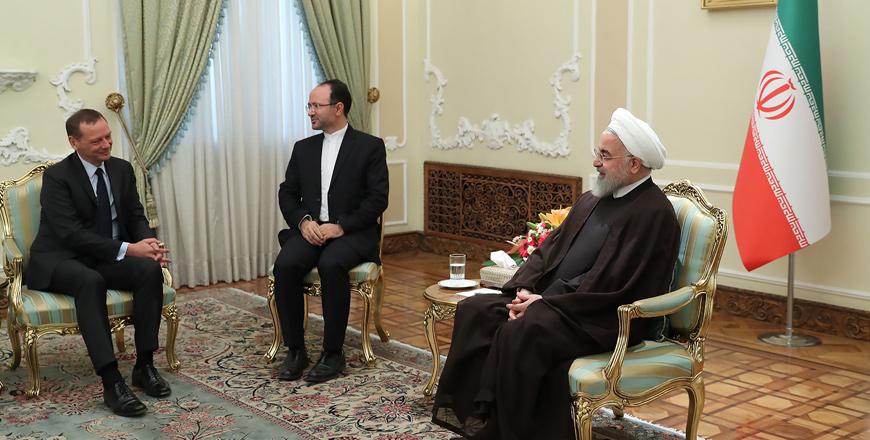You are here
'Iranian daily enrichment of uranium on rise'
By AFP - Jan 16,2020 - Last updated at Jan 16,2020
TEHRAN — Iranian President Hassan Rouhani said on Thursday that his country's "daily enrichment" of uranium was currently "higher" than before the conclusion of the 2015 nuclear deal.
Rouhani, who instigated the negotiations, made the comments while justifying his nuclear policy and Iran's progressive disengagement from the accord. He also stated his willingness to continue dialogue on the agreement.
"Today, we are under no restrictions in the area of nuclear energy," he said during a speech in Tehran.
"Our daily enrichment [of uranium] is higher than it was before... the agreement," he added, in remarks apparently directed at Iranian ultraconservatives who denounce his nuclear policy as a total failure.
Rouhani did not specify whether Iran was now producing a greater quantity of enriched uranium, or whether it was enriching ore with uranium 235 isotopes at a higher level than before the deal.
Iran accused European governments Thursday of sacrificing a troubled 2015 nuclear deal to avoid trade reprisals from US President Donald Trump who has spent nearly two years trying to scupper it.
Foreign Minister Mohammad Javad Zarif said Trump was again behaving like a "high school bully" and the decision by Britain, France and Germany to heed his pressure to lodge a complaint over Iranian compliance deprived them of any right to claim the moral high ground.
The three governments “sold out remnants of #JCPOA [the nuclear deal] to avoid new Trump tariffs”, Zarif charged.
“It won’t work my friends. You only whet his appetite. Remember your high school bully?”
Germany’s defence minister on Thursday confirmed a Washington Post report that the United States had threatened to impose a 25 per cent tariff on imports of European cars if EU governments continued to back the nuclear deal.
“This expression or threat, as you will, does exist,” Annegret Kramp-Karrenbauer told a news conference during a visit to London.
Zarif said Europe’s unwillingness to antagonise the United States made a mockery of its stated determination to rescue the nuclear deal.
“If you want to sell your integrity, go ahead,” Zarif tweeted. “But DO NOT assume high moral/legal ground.”
The 2015 agreement was struck in Vienna between Iran and France, Britain, Germany, the United States, China and Russia.
But it has threatened to collapse since President Donald Trump unilaterally withdrew the United States in 2018, before reimposing a series of intensifying economic sanctions on Iran.
In response, Tehran has progressively reduced a number of its key commitments to an agreement that drastically limited its nuclear activities.
Iran is now producing uranium enriched beyond the 3.67 per cent set by the agreement, and no longer adheres to the limit of 300 kilogrammes imposed on its enriched uranium stocks.
The Islamic republic announced on January 5 that it was no longer bound by limits on the number of centrifuges it could run to enrich uranium, saying this was its last step back from the commitments it made in Vienna.
Before then, Iran announced it was enriching uranium to a level of 5 per cent, far from the 90 per cent needed to produce an atomic bomb. Before the nuclear deal, Iran was enriching uranium to 20 per cent.
A source close to the International Atomic Energy Agency told AFP on January 10 that there had been “no notable change in Iran’s nuclear activity” since January 5.
Related Articles
TEHRAN — French President Emmanuel Macron's top diplomatic adviser met with Iran's president on Wednesday winding up a day of talks in Tehra
Iran will have no choice but to step up its uranium enrichment if a bill now moving through parliament is approved, even though it has no current need for such highly enriched uranium, its nuclear chief said on Saturday.
TEHRAN — President Hassan Rouhani on Tuesday ruled out holding any bilateral talks with the United States and threatened to further cut Iran













